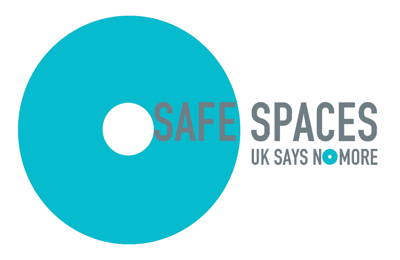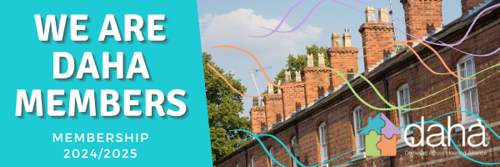Exit this page
Contents
How to get help and support
Support services for domestic abuse
What is domestic abuse?
Do you think you may be perpetrating domestic abuse?
What we can do to help
Additional services
Why do people stay in an abusive relationship?
Victims stories
DAHA accreditation
Statistics
Victim blaming language
Domestic Abuse is a criminal offence
You have the right to feel safe in your home which is why we take any report of domestic abuse or violence extremely seriously. Domestic Abuse is everyone’s responsibility. Don’t just sit back, report it.
If you are worried about anyone, please contact us or see the list of specialist services here or contact mhs homes on 01634 565333 (9am - 5pm, Monday to Friday).
Your safety is priority. If you, or someone you know is in immediate danger, dial 999 and ask for the police.
Exit this page
How to get help and support if you or someone you know is experiencing domestic abuse
If you're in immediate danger
Call 999 immediately if you or someone you know is in danger.
If you need the police but can't speak
If you're in danger and unable to talk on the phone, listen to the questions from the operator and if possible respond by coughing or tapping the head set.
On a mobile you may be prompted to press 55, this will transfer your call to the police.
On a landline if only background noise can be heard and operators cannot decide whether an emergency service is needed, then you will be connected to a police call handler.
If you replace the handset, the landline may remain connected for 45 seconds in case you pick up again.
When 999 calls are made from landlines, information about your location should be automatically available to the call handlers to help provide a response.
If you're not in immediate danger
If someone isn't in immediate danger and needs help, contact the police on 101.
Exit this page
Support services for domestic abuse
This is a list of organisations you can get in touch with for support.
Domestic abuse support services in Kent and Medway
Domestic abuse services website
Domestic Abuse One Stop Shop
Sunlight Centre, Richmond Road, Gillingham
Every Tuesday - 9.30am - 12noon (no appointment needed)
Exit this page
Choices - Providing specialist domestic abuse services
Helpline 0800 917 9948
Email: info@choicesdaservice.org.uk
Exit this page
Medway Council
Report adult abuse
Call 01634 334466 (8:30am - 5pm). Outside of these hours call 03000 419 191.
Report concern about a child
If you think the child is at immediate risk of harm call straightaway on 01634 334 466 Monday to Friday from 9am to 5pm outside of these hours call 03000 419 191.
Exit this page
Oasis Domestic Abuse Service
Oasis Domestic Abuse Service is a charity that helps adults, children and young people in Kent and Medway build a safe, positive future free from harm.
Oasis Domestic Abuse Service website
Call: 0800 917 9948 (Monday, Tuesday and Wednesday 9.30am – 11.30am, 12.30 – 2.30pm;
Thursday and Friday 9.30am – 11.30am).
Outside of these hours call 0808 2000 247
Exit this page
Kent County Council
Concerned about an adult?
Call 03000 41 61 61 (text relay 18001 03000 41 61 61)
Email social.services@kent.gov.uk
Concerned about a child?
Call 03000 41 11 11 (text relay 18001 03000 41 11 11)
Email social.services@kent.gov.uk
Exit this page
Kent Police
Report domestic abuse to Kent Police online or call them on 101.
If you're in immediate danger call 999 immediately.
Exit this page
What is domestic abuse?
Domestic abuse as an incident or pattern of incidents of controlling, coercive, threatening, degrading and violent behaviour, including sexual violence, in the majority of cases by a partner or ex-partner, but also by a family member or carer.
You can be abused by anyone who is over 16 years old with whom you have a relationship with.
Domestic abuse is not just about hurting someone physically or sexually. Domestic abuse can take many forms, some of which can be hidden and not easy to recognise. mhs homes understand the list below is not exhaustive and every individual case of domestic abuse is unique.
- Threatening language. For example, threats to kill the victims/survivors children, family, pets, and friends.
- Stalking. Never letting the victim/survivor out of their site and questioning them on their every move.
- Isolating the victim/survivor and not letting them go out on their own or to see family and friends on their own.
- Embarrassing, undermining, and humiliating the victim/survivor in front of others.
- Telling the victim/survivor that they are a bad parent.
- Telling the victim/survivor they are useless at everything.
- Making the victim/survivor believe that no one would believe them if they told people what was happening.
- Depriving someone of their basic needs such as food, medication, toiletries, etc.
- Monitoring a person via online communication tools and spyware.
- Using digital systems such as smart devices or social media to coerce, control, or upset the victim/survivor which can include posting ‘triggering’ material or threatening to post sensitive/private photos or information.
- Taking control over what the victim/survivor wears, how they look, when they sleep.
- Removing doors in the house so that the victim/survivor can be seen at all times
- Forcing the victim/survivor to take part in criminal activity such as shoplifting, neglect, abuse of children to prevent disclosure of abuse.
- Rewarding ‘good behaviour’.
- Intimidating behaviour, such as blocking access to doors, raising their hand.
- Preventing the victim/survivor from access to medical treatment and advice.
- Making the victim/survivor account for their spending.
- Controlling the household finances.
- Not allowing the victim/survivor to work.
- Raising debt against the victim/survivor’s name.
- Not allowing the victim/survivor to have any money of their own.
- Not allowing the victim/survivor any say on how they spend money.
- Rape and coerced sex.
- Forcing a victim/survivor to take part in unwanted sex or sexual acts.
- Refusal to practice safe sex or use contraception.
- Threatened or actual sexual abuse on children.
- Pushing or shoving.
- Restraining.
- Hitting, slapping, or punching.
- Kicking.
- Hitting with objects.
- Stabbing or cutting.
- Usually perpetrated by the victim/survivor’s family, extended family and members of the community.
- There is no specific offence for honour-based abuse but can be a collection of different forms of abuse used to control behaviour within families or other social groups to protect perceived cultural and religious beliefs or ‘honour’.
- FGM (Female Genital Mutilation).
- Breast flattening.
- Dowry abuse.
It does not matter if the abuse is continuous or a one-off incident.
ANYONE can be a victim of domestic abuse, regardless of gender, age, ethnicity, socio-economic status, sexuality, disability or background.
Do you think you may be perpetrating domestic abuse?
If you do, and you want to change your behaviour, help is out there.
Speak to one of our support officers, by calling us on 01634 565333, or contact Kent Community Domestic Abuse Programme (CDAP), which is a local service designed to help men who feel their behaviour towards their partner has been, or is still, abusive.
Exit this page
What we can do to help
First off, anything you tell us will be kept confidential unless we are legally required to report it. We won’t tell the person that you spoke to us. We will treat all reports as a priority.
We can:
Help you find the right support with specialist services
Our team of support workers can offer housing support and advice, talk with you about your options and will work with other agencies to get the support you need.
Help you find emergency accommodation or put you in touch with a refuge if you are in immediate danger.
Provide extra security measures to your home such as:
- Additional security lighting
- Fit extra locks and chains on doors
- Install visual security measures
- Arrange a fireproof letterbox through Kent Fire & Rescue
Exit this page
Additional services

Safe Spaces
UK SAYS NO MORE is working with a range of pharmacies and banks across the UK to provide Safe Spaces in their consultation rooms for people experiencing domestic abuse...
Read more
Additional support
A list of services and charities offering support and advice on any questions related to domestic abuse and honour-based violence. Contact through phone or email here...
Read moreExit this page
Why do people stay in an abusive relationship?
There are lots of different reasons why people stay in abusive relationships:
- You might feel frightened to leave, as you worry that the person abusing you will try and stop you and become even more violent.
- You might rely on the person abusing you for practical or financial support.
- You worry about losing your home and access to your children or family members.
- You may enjoy the good times you have with them and keep hoping it won’t happen again.
- They may have threatened to harm people you care about if you leave.
- You may be reliant on the person abusing you because of your legal or immigration status.
- You may feel you have no choice but to stay.
Exit this page
Exit this page
DAHA accreditation
We are working on improving our approach towards domestic abuse and are proud to be working towards an accreditation with the Domestic Abuse Housing Alliance (DAHA). We are always grateful to receive comments and feedback on the way we handle domestic abuse, so please get in touch.
Exit this page
Statistics
Although data on domestic abuse is not 100% accurate, the Crime Survey of England and Wales (CSEW) offers the best data available. It shows that:
- Around one in four women have experienced domestic abuse since the age of 16.
- For men, the figure is around 1 in 7.
- In the year ending December 2023, the police recorded a domestic abuse offence approximately every 40 seconds (ONS, 2024).
Victim blaming language
We may not think about it, but the language we use when talking about victims/survivors of domestic abuse can play a huge part in whether or not they seek help.
We have all likely used harmful phrases at times, often without realising the impact they might have, even when our intentions were good.
Many victims/survivors are unaware they are being abused, this could be due to the normalisation of abusive and controlling behaviours, not being fully aware of what constitutes as abuse, and/or the perpetrator deploying tactics to ensure the victim/survivor remains under their control. This leaves the victim/survivor feeling, confused, exhausted, and disorientated. This awareness is crucial when identifying a potential victim/survivor and swiftly and assertively flagging and signposting the case.
It is essential to understand that separating from or leaving a perpetrator puts victims/survivors and their children in greater danger. A victim/survivor is most at risk of harm and/or homicide from a perpetrator at the point of separation and post separation. A 'leave' ultimatum given by safeguarding professionals can put the victim/survivor and their child/ren at further risk of harm.
Exit this page
|
Harmful Common Phrases and Beliefs |
Anti Victim/Survivor Blaming Alternative |
|
They should just leave/why don't they leave. |
The perpetrator should stop abusing, the victim/survivor is not able to leave. |
|
They refuse to leave the abuser. |
They are not able to leave the abuser. |
|
They always go back to the abuser. |
The perpetrator continually coerces/grooms/manipulates/threatens the victim/survivor to return. |
|
They are not protecting their children from the perpetrator. |
The parent and children are victims/survivors of the perpetrator. |
|
If they didn't say 'no', fight back or scream then it wasn't rape. |
The behaviour of the victim/perpetrator does not influence the informed choice of the perpetrator. |
|
They are difficult to engage/work with. |
It may not be safe for them to engage with services. Services may not be approaching in the right way. It may not be the right time for them to have support service provision. This should be their choice. |
|
They should have reported it sooner or told someone sooner. |
No one should ever be judged or blamed for not wanting/not being able to report. |
|
Their low self-esteem and confidence made them vulnerable to abuse. |
Perpetrators are solely responsible for the abuse they perpetrate. Low self-esteem and/or confidence does not cause abuse. |
|
They allowed their children to witness the assault. |
It is solely the perpetrator who is responsible for their children being subjected to the abuse they are perpetrating against them. |
|
Their risk-taking behaviour will lead to them being abused/exploited. |
The perpetrator is solely responsible for abuse/exploitation, the actions of the victim/survivor do not cause abuse. |
|
They are lying about being raped/abused. |
Most people that are raped or subjected to forms of sexual abuse/assault/violence never report it to the police. |
|
Their engagement is superficial/ disguised compliance. |
A full understanding of engagement/non-engagement needs to be considered. Both due to consequences from the perpetrator, and fear/secondary traumatisation from services. |
|
They need to be educated about abuse and gain an awareness to avoid abusive relationships in the future. |
Education and awareness does not stop abuse/violence. It should not be relied upon for a victim/survivor to modify their behaviour when the perpetrator has more power than them. |
|
They keep choosing violent relationships. |
No perpetrator will seduce their victim/survivor with violent behaviour, on the contrary, they are usually kind, and charming. The perpetrator chooses to abuse their victim/survivor. |
|
They should have known it was going to happen. |
No one should predict offenses against them. |
|
What should they expect wearing revealing clothes/ drinking alcohol/taking drugs. |
The victim/survivor's appearance, and/or behaviour does not cause abuse. |
|
They sell/exchange sex for things they want and need. |
The perpetrator is grooming and exploiting them, to sexually abuse them. Sexual Coercion - "the act of using pressure, alcohol, drugs, or force to have sexual contact with someone against their will" and includes persistent attempts to have sexual contact with someone who has already refused." (loveisrespect.org, 2023). |



